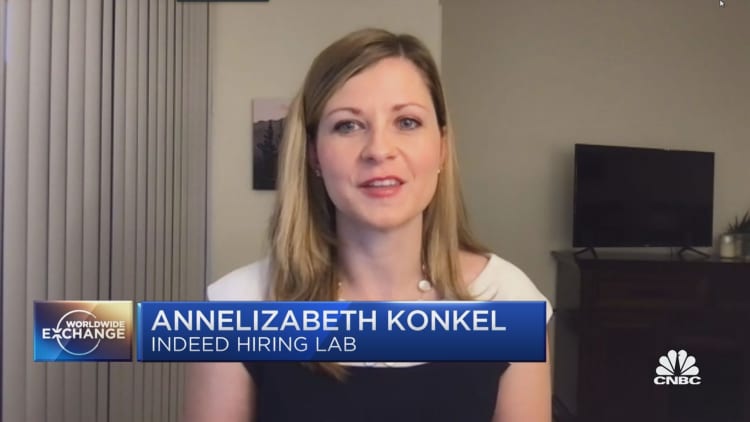Workers continue to benefit from a hot job market characterized by near-record demand for their labor, which has translated to ample choice and higher pay.
However, there are signs of a slowdown in some industries and Federal Reserve policy could dampen the good times for workers.
"Workers still have a considerable amount of leverage in the U.S. labor market," according to an analysis by Nick Bunker, economic research director at the Indeed Hiring Lab.
More from Personal Finance:
What new graduates need to know about money and jobs
These bachelor's degrees from public colleges pay more than $100,000
25% of Americans are delaying retirement due to inflation
"[They're] having their moment in the sun, but some clouds are likely to come along and darken the outlook," he added.
There were 1.2 million layoffs in April, a record low, the U.S. Department of Labor said Wednesday. That indicates employers are trying to hold onto their workers amid an elevated number of open positions and voluntary resignations, or "quits."
Job openings hit 11.4 million at the end of April, a decrease from the record 11.9 million openings in March but still near all-time highs, according to the Labor Department. (Openings are a proxy for employer demand for workers.)

There were 1.9 job openings for every unemployed person in April, down slightly from almost 2 per person the month prior.
More than 4.4 million people quit their jobs in April, just 25,000 fewer than the record number in March, enticed by ample opportunity elsewhere.
Employers have nudged up wages to compete. Wage growth for the typical worker was up 6% in April relative to a year earlier, the biggest annual increase in more than two decades, according to the Federal Reserve Bank of Atlanta.
This really doesn't look like a labor market that's about to tip into recession.Daniel Zhaosenior economist at Glassdoor
But there are signs that growth may have plateaued. The 6% rate, while elevated by historical standards, was unchanged from March 2022.
"It seems things have smoothed out a little bit but are still holding at an extremely high level of employer demand," said Daniel Zhao, senior economist at career site Glassdoor.
"And even though there have been concerns about a downturn or even a recession, this really doesn't look like a labor market that's about to tip into recession," he added.
Employer demand swelled starting in early 2021 as the U.S. economy opened more broadly from its pandemic-induced doldrums and as Covid-19 vaccines became more widely available.
Workers didn't respond in lockstep, for many reasons like ongoing health concerns, family caregiving responsibilities, cash reserves from household stimulus funds and a broader rethink of workers' careers.
However, job openings and quits dropped in sectors like retail and accommodation and food services, indicating a softening, according to Layla O'Kane, senior economist at Emsi Burning Glass.
"Some of the sectors that saw the [swiftest] increases in quitting and wage growth are starting to cool," Bunker said. "Times are still good for workers, but they are unlikely to get much better."
The Federal Reserve is raising interest rates to reduce high inflation, which may cool employer demand for workers. The ultimate impact and timing are unclear, though.
"The expectation is the labor market will cool down," Zhao said. "That's what the Fed is trying to do — cool down the economy and bring down inflation, and naturally we should expect the labor market to cool down, as well."


